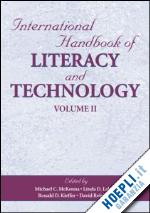Contents: Preface. M.C. McKenna, Introduction: Trends and Trajectories of Literacy and Technology in the New Millennium. Part I: The Role of Technology in the New Literacies. J. Lemke, Towards Critical Multimedia Literacy: Technology, Research, and Politics. R. Hobbs, Multiple Visions of Multimedia Literacy: Emerging Areas of Synthesis. O. Henao Alvarez, Developing Digital Literacies: Educational Initiatives and Research in Colombia. L. Verhoeven, E. Segers, J. Bronkhorst, L. Boves, Towards Interactive Literacy Education in the Netherlands. Part II: Technology Applications With Specific Populations. R.K. Olson, B. Wise, Computer-Based Remediation for Reading and Related Phonological Disabilities. B. Dalton, N. Strangman, Improving Struggling Readers' Comprehension Through Scaffolded Hypertexts and Other Computer-Based Literacy Programs. J. Turbill, J. Murray, Early Literacy and New Technologies in Australian Schools: Policy, Research, and Practice. M.J. Adams, The Promise of Automatic Speech Recognition for Fostering Literacy Growth in Children and Adults. A.G. Bus, M.T. de Jong, M. Verhallen, CD-ROM Talking Books: A Way to Enhance Early Literacy? Part III: Literacy Software and the Internet. J. Coiro, R.A.K. Klein, S. Walpole, Critically Evaluating Educational Technologies for Literacy Learning: Current Trends and New Paradigms. B. Stafford, L. Miller, M. Ollivierre, A Science-Based Development and Implementation Model for Online and CD-ROM Curriculum Programs. A. Fullerton, Can Information Get What It Wants? Barriers to Open-Access in Literacy Education. Y. Liu, D. Zhang, ICT and Chinese Literacy Education: Recent Developments in China. Part IV: Teacher Education and Professional Development. C.K. Kinzer, D.W. Cammack, L.D. Labbo, W.H. Teale, R. Sanny, Using Technology to (Re)Conceptualize Pre-Service Literacy Teacher Education: Considerations of Design, Pedagogy, and Research. R.E. Ferdig, L.R. Roehler, P.D. Pearson, Video-and Database-Driven Web Environments for Pre-Service Literacy Teaching and Learning. C. Harrison, D. Pead, M. Sheard, "P, not-P, and Possibly Q": Literacy Teachers Learning From Digital Representations of the Classroom. M.C. McKenna, K.M. Proctor, The Role of Technology in the Professional Development of Literacy Educators. Part V: The Potential of Technology in Key Dimensions of Literacy. L.B. Gambrell, Technology and the Engaged Literacy Learner. M.R. Kuhn, S.A. Stahl, More Than Skill and Drill: Exploring the Potential of Computers in Decoding and Fluency Instruction. P.A. Edwards, Family Literacy and Technology: Challenges and Promising Constructive Designs. N.K. Duke, E. Schmar-Dobler, S. Zhang, Comprehension and Technology. D.E. Alvermann, Technology Use and Needed Research in Youth Literacies. S. Templeton, Dispelling Spelling Assumptions: Technology and Spelling, Present and Future. C.L.Z. Blachowicz, J. Beyersdorfer, P. Fisher, Vocabulary Development and Technology: Teaching and Transformation. K. Bromley, Technology and Writing. E.B. Bernhardt, Real and Imagined Roles for Technology in Acquiring Second-Language Literacy. K.H. Au, Diversity, Technology, and the Literacy Achievement Gap. L.M. McGee, D.J. Richgels, Can Technology Support Emergent Reading and Writing?: Directions for the Future. E.J. Kame'enui, J.U. Wallin, Information Technology and the Literacy Needs of Special Populations: Ode to FedEx and Dairy Farmers. B.J. Walker, S.K. Goetze, Integrating Reading Assessment and Technology.











